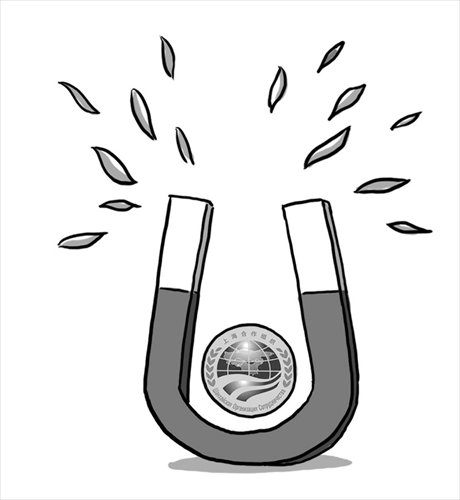HOME >> OP-ED
SCO expansion tricky but worthwhile
Source:Global Times Published: 2014-9-11 18:58:01

Illustration: Liu Rui/GT
The 14th meeting of the Council of Heads of State of the SCO member states is being held in Dushanbe, capital of Tajikistan.
Founded in 2001, the SCO brings together China, Kazakhstan, Kyrgyzstan, Russia, Tajikistan and Uzbekistan, with Afghanistan, India, Iran, Mongolia and Pakistan as observers, and Belarus, Turkey and Sri Lanka as dialogue partners.
The SCO has created a new Eurasian order, and has been playing an important role in regional affairs such as security and anti-terrorism against the backdrop of changing international and regional political pattern.
Despite its role expanding, the SCO has not added any new full members since 2001. The SCO is still working on the rules and procedures to bring in and manage new members.
This SCO summit will make a decision on the two draft documents on the SCO expansion passed at the meeting of the meeting of the Council of Foreign Ministers of the SCO in July 2013. If approved, it will mark the completion of the basic legal documents necessary for SCO expansion and the confirmation of accession procedures.
It is worth noting that this summit will not decide on any new members, as it is a complicated and long process. Given the minimum eligibility criteria for full membership, any country wishing for SCO membership must have observer status, submit an application to the Council of Foreign Ministers of the SCO, not be subject to UN sanctions or in a conflict with SCO countries, and various other conditions.
Among the existing observer countries, Iran and Pakistan have been the most enthusiastic. But due to their exposure to regional terrorism and their vulnerable economies, they are not favorable choices for SCO membership.
Mongolia is a better choice, but it hasn't decided whether it should apply for SCO membership or not.
This can be attributed to its own foreign policies, as it attaches importance to cooperate with the others under the SCO framework, while at the same time it seeks to develop ties with Western countries.
Energy-rich Turkmenistan is the only Central Asia republic that hasn't joined the SCO, but is viewed as a valuable potential member, as Richard Weitz, a senior fellow at the US think tank Hudson Institute, noted in a column.
As in 1995, Turkmenistan gained a formal position of permanent neutrality from the UN: It will not join any military or political unions or alliances. Yet it has managed to form cooperative relations with SCO states and work together either bilaterally or multilaterally.
Another dilemma that the SCO membership expansion faces is in choosing its dialogue partners.
The definition of dialogue partners is ambiguous. Its initial aim was to include major world powers or influential international organizations, but the current three dialogue partners, Turkey, Belarus, and Sri Lanka, don't fall into either category.
Now the annual summit doesn't even invite dialogue partners, making their positions embarrassing and their roles invalid. In the future, the SCO will try to elaborate the role of dialogue partners.
At least one candidate for full SCO membership is likely to be announced before the SCO summit next year when Russia holds the presidency.
Russia is eager to see the expansion of the SCO. Moscow cares more about the geopolitical value of the SCO than economic cooperation or cultural exchanges among the members.
Russia believes that the more members it has, the more geopolitical significance will be added to the SCO, especially during a time when the rivalry between Russia and the West is intense.
Central Asia has been the focus of SCO attention. Even when new members are added, it will not direct the organization's gaze toward other regions. The four Central Asian members also have the right to allow or not allow new members.
China will stick to SCO principles and procedures for expanding membership. It welcomes any new members and will continue to push forward pragmatic cooperation and internal unity.
It is true that there are huge differences among SCO members such as their geographic size, economic strength, and resource reserves. This is a problem that any regional or international framework faces.
Nonetheless, the SCO has managed to move forward since its founding, and this sets the condition for its possible expansion in the future.
The article was compiled by Global Times reporter Wang Wenwen based on an interview with Sun Zhuangzhi, secretary-general of the Shanghai Cooperation Organization Research Center, Chinese Academy of Social Sciences. wangwenwen@globaltimes.com.cn
Posted in: Viewpoint